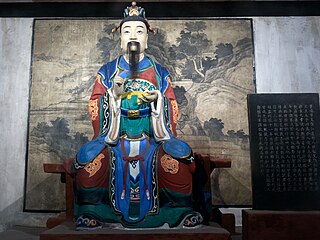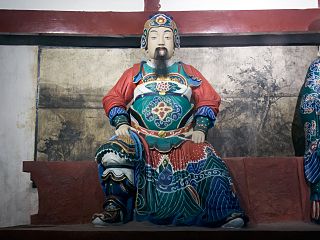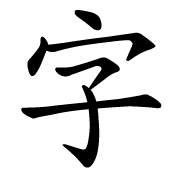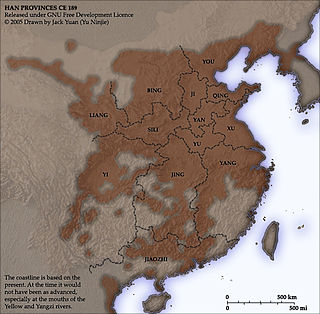
The Battle of Xiaoting, also known as the Battle of Yiling and the Battle of Yiling and Xiaoting, was fought between the state of Shu and the vassal kingdom of Wu between the years 221 and 222 in the early Three Kingdoms period of China. The battle is significant because Wu was able to turn the situation from a series of initial losses into a defensive stalemate, before proceeding to win a decisive victory over Shu. The Wu victory halted the Shu invasion and preceded the death of Liu Bei, Shu's founding emperor.

Zhao Yun, courtesy name Zilong, was a military general who lived during the late Eastern Han dynasty and early Three Kingdoms period of China. Originally a subordinate of the northern warlord Gongsun Zan, Zhao Yun later came to serve another warlord, Liu Bei, and had since accompanied him on most of his military exploits, from the Battle of Changban (208) to the Hanzhong Campaign (217–219). He continued serving in the state of Shu Han – founded by Liu Bei in 221 – in the Three Kingdoms period and participated in the first of the Northern Expeditions until his death in 229. While many facts about Zhao Yun's life remain unclear due to limited information in historical sources, some aspects and activities in his life have been dramatised or exaggerated in folklore and fiction. In the 14th-century historical novel Romance of the Three Kingdoms, he was lauded as a member of the Five Tiger Generals under Liu Bei.

Zhang Fei, courtesy name Yide, was a military general serving under the warlord Liu Bei in the late Eastern Han dynasty and early Three Kingdoms period of China. Zhang Fei and Guan Yu, who were among the earliest to join Liu Bei, shared a brotherly relationship with their lord and accompanied him on most of his early exploits. Zhang Fei fought in various battles on Liu Bei's side, including the Red Cliffs campaign (208–209), takeover of Yi Province (212–214), and Hanzhong Campaign (217–218). He was assassinated by his subordinates in 221 after serving for only a few months in the state of Shu Han, which was founded by Liu Bei earlier that year.

Liao Hua, courtesy name Yuanjian, originally named Liao Chun, was a military general of the state of Shu Han during the Three Kingdoms period of China.

Pang Tong (179–214), courtesy name Shiyuan, was an adviser to the warlord Liu Bei in the late Eastern Han dynasty of China. Originally a minor official in Nan Commandery in Jing Province, Pang Tong came to serve Liu Bei in 209 after the latter became the provincial governor. In the early 210s, he accompanied Liu Bei on a military campaign to seize control of Yi Province from the warlord Liu Zhang, but was killed by a stray arrow during a battle at Luo County in 214.

Ma Liang (187–222), courtesy name Jichang, was an official serving under the warlord Liu Bei during the late Eastern Han dynasty of China. He briefly served in the state of Shu Han, founded by Liu Bei, during the early Three Kingdoms period.

Fa Zheng (176–220), courtesy name Xiaozhi, was a key adviser to the warlord Liu Bei in the late Eastern Han dynasty. Born in a family of high social status and of noble descent, Fa Zheng travelled to Yi Province in the late 190s and became a subordinate of Liu Zhang, the provincial governor. However, his feelings of alienation and perception of Liu Zhang as an incompetent governor eventually led him to betray Liu Zhang and defect to Liu Bei in 211. Between 211 and 214, Fa Zheng assisted Liu Bei in overcoming Liu Zhang and seizing control of Yi Province, and became one of Liu Bei's most trusted advisers. In 217, he urged Liu Bei to launch the Hanzhong Campaign to capture the strategic Hanzhong Commandery from a rival warlord, Cao Cao, but died a year after Liu emerged victorious in the campaign.

Fei Yi, courtesy name Wenwei, was a regent and military general of the state of Shu during the Three Kingdoms period of China. Born in the late Eastern Han dynasty, Fei Yi started his career as an attendant to Liu Shan, the eldest son and heir apparent of Liu Bei, a warlord who became the founding emperor of Shu. After Liu Shan became emperor in 223, Fei Yi gradually rose to prominence under the regency of Zhuge Liang, the Imperial Chancellor of Shu. During this time, he concurrently served as a military adviser under Zhuge Liang and as Shu's ambassador to its ally state Wu. He also played a significant role in the conflict between the Shu general Wei Yan and Zhuge Liang's chief clerk Yang Yi. After Zhuge Liang's death in 234, Fei Yi served as a deputy to the new regent Jiang Wan and progressively assumed greater responsibilities as Jiang Wan gradually relinquished his powers due to poor health. In 244, Fei Yi led Shu forces to victory at the Battle of Xingshi against their rival state Wei and succeeded Jiang Wan as regent of Shu two years later following the latter's death. On the first day of the Chinese New Year in 253, Fei Yi was assassinated by a Wei defector, Guo Xiu.
Li Hui, courtesy name De'ang, was an official of the state of Shu Han during the Three Kingdoms period of China.

Dong Yun, courtesy name Xiuzhao, was an official of the state of Shu Han during the Three Kingdoms period of China. His father, Dong He, also served as an official in Shu. Dong Yun was one of four persons who held positions equivalent to a head of government in Shu from 221 to 253; the other three were Zhuge Liang, Jiang Wan and Fei Yi.

Deng Zhi, courtesy name Bomiao, was a government official, diplomat and military general of the state of Shu Han during the Three Kingdoms period of China. A descendant of Deng Yu, Deng Zhi started his career in the late Eastern Han dynasty under the warlord Liu Bei as a low-level officer in Pi County. After Liu Bei discovered his talent, Deng Zhi steadily rose through the ranks to become a county prefect and later a commandery administrator and imperial secretary. In 223, the Shu regent Zhuge Liang sent him as Shu's envoy to meet Sun Quan, the ruler of Shu's ally state Wu, and reestablish the Wu–Shu alliance against their common rival state Wei. Deng Zhi succeeded in his mission and earned praise from Sun Quan for strengthening Wu–Shu ties. In 227, Deng Zhi became a military general and he participated in the first Shu invasion of Wei by leading a decoy force with Zhao Yun to distract the Wei general Cao Zhen. Although they lost the battle, Deng Zhi and Zhao Yun managed to rally their troops to put up a firm defence during their retreat and minimise their losses. Following Zhuge Liang's death in 234, Deng Zhi rose to higher general ranks and was stationed in present-day Chongqing for about 10 years before he was recalled back to the Shu capital Chengdu in his 70s to serve as General of Chariots and Cavalry. In 248, he suppressed a rebellion in Fuling. He died in 251.
Liao Li, courtesy name Gongyuan, was an official of the state of Shu Han during the Three Kingdoms period of China.
Yi Ji, courtesy name Jibo, was an official serving in the state of Shu Han during the Three Kingdoms period of China. He previously served under the warlord Liu Biao in the late Eastern Han dynasty before coming to serve Liu Bei, the founding emperor of Shu Han.
Huo Yi, courtesy name Shaoxian, was a military general of the state of Shu Han in the Three Kingdoms period of China. His father, Huo Jun, served under Liu Bei, the founding emperor of Shu. During his service under the Shu emperor Liu Shan, Huo Yi suppressed tribal rebellions in the restive Nanzhong region and maintained peace in the area. After Shu was conquered by its rival state Cao Wei in 263, Huo Yi surrendered to the Wei regime and was permitted to remain in charge of keeping the peace in Nanzhong. In return, Huo Yi became a Wei subject and presumably continued serving under the Jin dynasty, which replaced the Wei regime in 265.
Zong Yu, courtesy name Deyan, was a military general and diplomat of the state of Shu Han during the Three Kingdoms period of China.
This article contains the family trees of members of the Liu clan, who ruled the state of Shu Han (221-263) in the Three Kingdoms period (220-280) in China. They were related to the House of Liu, the imperial clan of the Han dynasty.
Zhou Qun, courtesy name Zhongzhi, was an official, astronomer and diviner who served under the warlords Liu Zhang and Liu Bei in the late Eastern Han dynasty of China. Two of his interpretations of comets are preserved in volumes 102–104 of the Book of the Later Han, presumably through quotation by Qiao Zhou.
Zhang Yu, courtesy name Nanhe, was an official, diviner and physiognomist who served under the warlords Liu Zhang and Liu Bei in the late Eastern Han dynasty of China.
Yang Xi, courtesy name Wenran, was an official of the state of Shu Han during the Three Kingdoms period of China. He is best known for writing the Ji Han Fuchen Zan, a collection of praises of notable persons who served in the Shu Han state. Chen Shou, the third-century historian who wrote the Records of the Three Kingdoms (Sanguozhi), extensively quoted and annotated Yang Xi's collection.





















